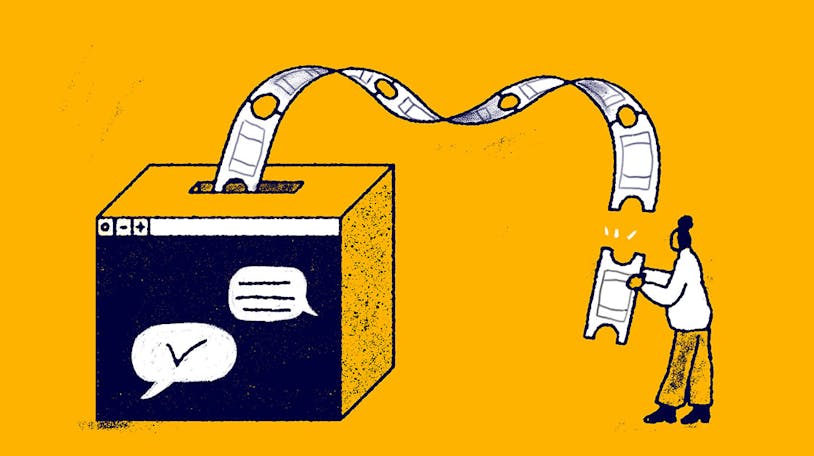The 11 Best Help Desk Ticketing Systems for 2023


Choosing a help desk ticketing system can be tricky.
With so many options and features to consider, it’s easy to get sidetracked and overwhelmed. A step-by-step approach to choosing the ideal system helps everyone stay on track and, eventually, benefit from the tools they need to do their work.
Below, we’ll walk you through the best questions to ask and outline some extra tips that will help guide you to the best ticket system for your business.
Short on time? Choose Help Scout and get a free 15-day trial
If you don't have time to read this article but you want to know the right software to choose: it's Help Scout. Take a look at some of our product information below, or get started today with a free 15-day trial.
What is a help desk ticketing system?
A help desk ticketing system is software that keeps track of customer issues so your support or IT team can resolve them in a timely manner. It gives the team the everyday tools they need to do their job well, from answering tickets to collaborating with other team members.
Typically in ticketing systems, a customer contacts the help desk with an issue and the system automatically creates a ticket. Each ticket gets a unique ID, allowing it to be easily tracked throughout its lifecycle. The ticket management system stores all relevant information about the issue, including the customer's contact information, the nature of the problem, any attempted solutions, and the status of the ticket (e.g., open, pending, closed).
A key feature of help desk ticketing systems is their capacity for categorization and prioritization. They can classify tickets based on criteria like issue type, customer importance, or severity of the problem. This allows support teams to respond to the most critical issues first, improving response times and ultimately making your customers happy.
Comparing the best ticket software on the market
| Ticketing Software | Price | Key Features |
|---|---|---|
Help Scout ⭐ | Starting at $20/user per month. |
|
ProProfs | Starting at $20/user per month. |
|
Zoho Desk | Starting at $14/user per month. |
|
Zendesk | Starting at $19/agent per month. |
|
HubSpot Service Hub | Free plan available. Paid plans start at $18 per month. |
|
Freshdesk | Free plan available. Paid plans start at $15/agent per month. |
|
Front | Starting at $19/seat per month. Minimum two seats required. |
|
Jira Service Management | Free for up to three agents. Paid plans start at $21/agent per month. |
|
Freshservice | Starting at $19/agent per month. |
|
Vision Helpdesk | Starting at $12/agent per month for SaaS cloud plans. Self-hosted plans start at $8/agent per month. |
|
JitBit | Hosted plans starting at $29 per month. Self-hosted downloads start at a flat rate of $2,199. |
|
The 11 best help desk ticketing systems
Ready to learn more? Here are the 11 best help desk ticketing systems to add to your shortlist.
1. Help Scout
Best help desk ticketing system for growing customer support teams.
Help Scout is the ultimate tool for customer support. From shared inboxes and customer management tools to workflows, reporting, and live chat, Help Scout has it all.
More than that, it’s incredibly easy to sign up and immediately get the customer support ball rolling so teams of all sizes can benefit.
Features:
Use the shared inbox to collaborate with your team members and to ensure everyone is aware of important conversations and customer issues.
Manage customer conversations in one seamless inbox, whether they get in touch with you via email or in real time via live chat.
Set up workflows and automatic responses and utilize AI tools to lower response times and start helping customers faster.
Build a knowledge base with quick how-tos and tutorials showcasing how customers can use your product.
Access reporting and analytics to keep up with support team performance.
Price: Free trial available. Plans start at $20/user per month.
Learn more about Help Scout:
2. ProProfs
Best help desk ticketing system for teams that need a central place for customer and IT support requests.
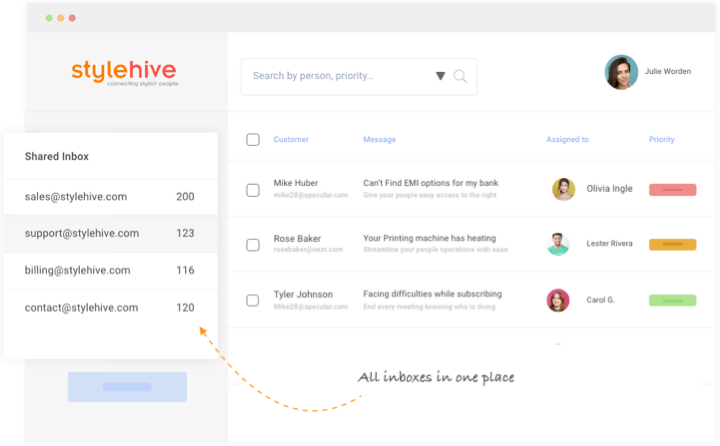
ProProfs’ help desk is great for both customer support and IT teams alike. Both use cases can utilize the platforms to offer multichannel support across email, phone, live chat, and a help center. It provides collaboration features like internal notes and automation capabilities for a streamlined workflow.
Features:
Use round-robin ticket assignment to evenly distribute support tickets to agents.
Create pre-written responses that allow for faster response times.
Find key customer support metrics in your help desk reports.
Price: Free trial available. Plans start at $20/user per month.
3. Zoho Desk
Best help desk ticketing system for teams using other Zoho products.
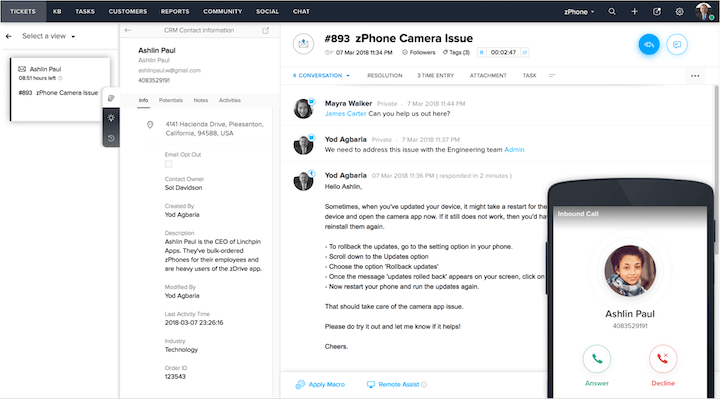
Zoho Desk is a part of the Zoho suite of business tools (think Zoho CRM, Books, etc.). It’s ticket management software that allows your customer service team to communicate with customers across various channels.
Features:
Receive and respond to messages from multiple channels in one inbox.
Connect to a multitude of integrations with tools your company is already using to create a seamless customer experience.
Create a self-service portal with tutorials and FAQs for users to search through on their own.
Price: Free trial available. Plans start at $14/month.
4. Zendesk
Best help desk ticketing system for enterprise customer service teams.
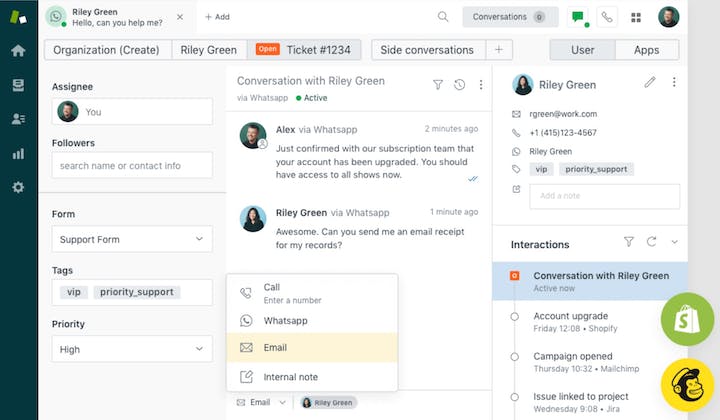
Zendesk allows customer support teams to manage conversations across various platforms. Support agents can tag issues, choose the channel they respond with, set priorities, track interactions, and more.
Features:
Use cross-channel communication to reach your customers where they are, whether that’s email, Facebook, Twitter, live chat, etc.
Use AI-powered chatbots to help personalize auto-responders until an agent is available to help.
Set up a help center or knowledge base for customers who want a more DIY approach.
Price: Free trial available. Plans start at $19/agent per month.
5. HubSpot Service Hub
Best help desk ticketing system for teams looking for a central, cross-functional suite of tools.

HubSpot is another tool with a suite full of options for sales, marketing, and customer service teams. Companies can pick and choose between the tools they need, meaning HubSpot can be a great all-in-one tool across departments.
Features:
Use the video messaging feature to create personalized help videos for your customers.
Connect email inboxes, live chat, Facebook Messenger, and more into a single shared inbox for seamless communication.
Create and send customer satisfaction surveys to gauge your support team’s performance.
Use popular help desk features like ticketing management, knowledge base setup, live chat, and automation.
Price: Free plan available. Paid plans start at $18 per month.
6. Freshdesk
Best help desk ticketing system for call center-focused teams.

Freshdesk is a help desk system that lets teams really unleash the power of AI to help automate and streamline their customer support. With the ability to recommend related knowledge base articles to agents and close completed tickets, its AI (named “Freddy”) can be an asset to your team.
Features:
Use collaborative ticketing to allow agents to work together to complete a service request.
Auto-assign tickets to the best agent for the job using their AI feature.
Customize dashboards to showcase team performance metrics and analytics.
Price: Free trial and plan available. Paid plans start at $15/agent per month.
7. Front
Best help desk ticketing system for teams that only provide support via email.

Front is a hub combining your customer service and communication all in one online space. This app is a great way to improve team collaboration on customer issues.
For example, even if one agent has started working on a ticket, other agents are still able to see that ticket’s progress, hopping in to help if they’re able.
Features:
Share email drafts with teammates to gather feedback before sending to customers — perfect for training.
Use workflows that allow your team to respond to customer messages faster.
Examine analytics that provide deeper insights into the amount of requests your team receives, your overall customer experience, and more.
Prioritize VIPs so top customers are immediately escalated.
Price: Free trial available. Plans start at $19/seat per month. Minimum two seats required.
8. Jira Service Management
Best help desk ticketing system for engineering teams.
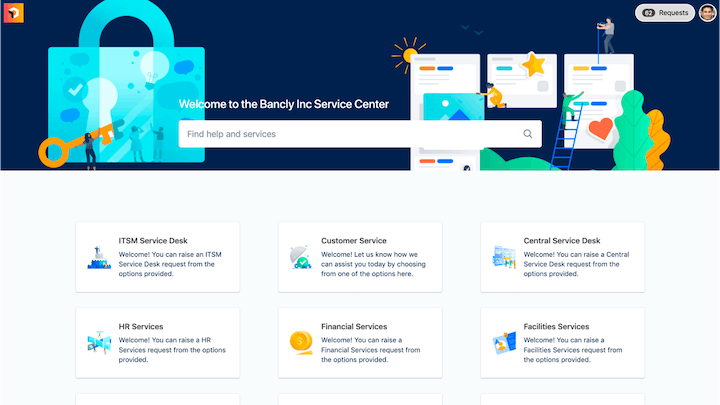
Jira Service Management is a tool from Atlassian that handles request management, asset management, change management, incident management, problem management, and more. Its seamless integration with Jira's project management offering makes it a go-to for IT and development teams.
Features:
Build custom add-ons using the Jira API.
Access a library of different automation rules to make the most out of your tool.
Connect with your project management tool to decrease the learning curve of your IT team’s software.
Price: Free for up to three agents. Paid plans start at $21/agent per month.
9. Freshservice
Best help desk ticketing system for IT support teams at enterprise companies.
Freshservice is owned by the parent company of Freshdesk, but this tool is catered more to IT service than to customer service. IT project management, an IT service desk, and even IT asset management services come with this tool.
Features:
Set policies based on business hours, ticket categorization, and more using service level agreements (SLAs).
Send ticket assignments right to your integrated project management dashboard.
Use reporting tools to measure your help desk’s overall performance.
Price: Free trial available. Plans start at $19/agent per month.
10. Vision Helpdesk
Best help desk ticketing system for ITIL/ITSM.
Vision Helpdesk offers a number of customer service products perfect for customer service and IT teams. From its satellite help desk to its ITIL/ITSM (IT infrastructure library and IT service management) compliant desk, this tool is ideal for teams that need an emphasis on security for their customer data.
Features:
Utilize the mobile app for customer communication on the go.
Take advantage of live chat software for both sales and customer service teams.
Manage customer conversations from live chat, social media, email, phone, and more.
Price: Free trial available. Plans start at $12/agent per month for SaaS cloud license. Self-hosted plans start at $8/agent per month.
11. JitBit
Best help desk ticketing system for teams wanting self-hosted software.
JitBit is help desk software built for IT, SaaS, email, and more. With the option to host with JitBit or download to your own servers, this is a great option for companies that require security and privacy, especially when dealing with customer service.
Features:
Host JitBit on your own servers, ensuring your customer support is as secure as possible.
Access an email ticketing system for companies that rely on email above all else.
Save responses and quickly reply to customers without having to type the same thing again and again.
Price: JitBit-hosted plans start at $29 per month (includes one agent). Self-hosted downloads start at a flat rate of $2,199 (includes ten agents).
What features do help desk ticketing systems typically have?
While help desk features will vary from platform to platform, they all have the same goal of helping teams manage customer issues more efficiently.
Some of the most common ticketing system features include:
Omnichannel support: The ability to manage customer and user requests across all communication channels (email, chat, phone, social media, etc.) from a single user interface.
Ticket management: Support and IT teams use features like ticket assignments, tags, folders/views, and custom fields to track issues from first contact through to resolution.
Workflow automation: Help desks make it easier to manage tickets by automating parts of the ticket management process, such as assignments, tagging, etc.
Customer profiles: Many tools allow you to see important customer data within the tool, such as their conversation or purchase history, making it easier to troubleshoot and personalize your support.
Proactive support tools: Some support ticketing software may include proactive support tools that allow you to surface helpful information to users within your user experience based on specific criteria like time on page or the users' scrolling behavior.
Knowledge management: Most ticketing systems will offer a knowledge base solution that allows you to publish answers to FAQs for improved self-service support.
Reporting: All support and IT platforms come with reporting functionality that enable you to create dashboards for tracking things like ticket volume and the types of issues reported.
Integrations: Look for a help desk that easily connects with other systems that are used within your organization. It helps create a comprehensive view of your business’s customer experience.
Artificial intelligence (AI): While this feature set is still quite new, more and more platforms are starting to incorporate AI into their systems to handle tasks like summarizing email threads, translating text, and determining customer sentiment.
Asset management functionality: Ticketing systems that focus on the IT sector may also have features that help the team manage company assets like computers, cell phones, and tablets.
The benefits of investing in a help desk
Before moving to a help desk or ticketing tool, most businesses will operate their support or IT operations out of an email account. While a good solution for smaller companies, it usually isn’t sustainable as the business starts to scale.
Some of the warning signs that you've outgrown your current solution might include:
Support requests keep slipping through the cracks.
Team members send duplicate responses to the same email.
You don’t know who has been working on a complicated support issue.
Team feedback is completely subjective and is not connected to metrics.
It’s impossible to collaborate on cases with transparency.
Help desk software solves these issues by introducing:
Centralized communication: Fielding customer requests through multiple email accounts or platforms gets confusing. When everything is in one place, it makes it easier to stay on top of conversations.
Better transparency: Help desks make it easier for you to see the full picture. Teams can see who is working on what, where a customer issue is in the pipeline, and the type and volume of requests the team is fielding at any given time.
Increased collaboration: Ticketing systems enable teams to work together more effectively. There are no confusing email threads or forwarded messages. Instead, folks can assign tickets to a teammate or tag in a colleague when they need advice, ensuring customers always get the best answer possible.
Improved organization: Though email software typically comes with some kind of labeling system, it can still be easy to lose track of specific messages as new ones come in. With support software, you can tag issues, sort them into folders, view cases by different criteria (assignee, status, etc.), and quickly locate similar tickets through the platform’s search engine.
A way to quantify your efforts: Help desks have reporting capabilities that let you know what you’re doing well and what needs work so that you can start to make data-driven decisions.
What to look for in a help desk ticketing solution
As you begin to evaluate your help desk options, consider how your customers prefer to interact with your company. Do they prefer to call or email? How soon do they expect a response from your team? Are they comfortable using self-service tools?
Even if your current system doesn’t have an easy way to answer these questions, you can sift through old support requests and speak to the rest of the team about it. They may also have ideas on must-have features or how to improve your current system.
For example, your company might benefit from a ticket routing feature where support requests of a certain category get automatically forwarded to the right team. Or you might want to investigate ticketing software options that can integrate with your CRM software or with internal communications software, like Slack.
Here are a few questions that you can use as a jumping-off point for assessing which features to prioritize:
What value does this feature add to our customers and to our team?
Do we need to connect this feature to other products or services? If so, is that possible?
Do we need to adhere to any technical requirements, like data formatting?
Are there legal requirements we have to meet as a team (e.g., data storage)?
Buyer’s Guide to Choosing the Right Customer Support Tool
Tailored to help you identify your customer support needs, this guide will help you find the right solution, simplify your purchase decision, and get leadership buy-in.
Get the guide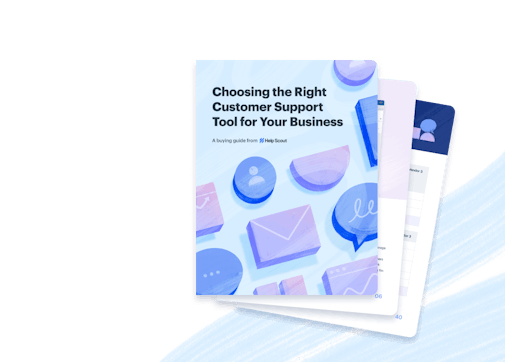
Help desk ticketing system best practices
Once you’ve decided on a tool, it’s time to dive in! Here are five tips for getting the most out of your new help desk ticketing system:
1. Learn the software
Have you ever purchased a new tool or subscribed to a new service that you were sure was going to change your life, only to abandon it a few months later because you weren’t using it?
One of the reasons this can happen is that even when the learning curve is gentle, getting used to new software and workflows takes time and effort. However, when it comes to something like a help desk, putting in the time can make all of the difference.
At Help Scout, we try to make things easier for onboarding customers by providing a lot of resources including:
A detailed guide that walks you through important onboarding tasks like setting up your first mailbox.
An extensive help center and a blog full of useful content.
A helpful support team, ready to field your questions 24/6.
Look for software that comes with these types of resources to ensure that you are able to take advantage of all of the features and benefits that the platform offers.
2. Use time-saving features
Some of the first features you should familiarize yourself with are those that deal with productivity. These include:
Focusing on productivity tools will give your team more time for customers and ensure that you can get answers out quickly.
3. Invest in self-service
Another way to boost productivity is to embrace the concept of self-service. The best way to do this is to create a knowledge base.
Although writing up documentation takes time upfront, having self-service options that allow customers to find their own answers will cut down on ticket volume, reducing the stress on your team.
4. Anticipate customer needs
Help desks can help you provide customers with what they need before they ever reach out to your team. This can be through self-service options like the knowledge base mentioned above, or it can be through targeted campaigns that utilize proactive messaging features.
If there’s a point in the customer journey where folks tend to get stuck, use proactive messaging to surface a knowledge base article, offer a helpful tip, or launch a live chat with your team. Several tools mentioned in this post have these types of proactive features that can improve your customers’ experience and satisfaction.
5. Make data-driven decisions
Help desk ticket systems have the ability to supply you and your team with a lot of useful information, such as contact volume, product pain points, and customer feedback. This is only amplified when integrating your system with a CRM, product management tool, or ecommerce platform.
Use this data throughout your company to make data-driven decisions like staffing, prioritizing content creation, or even planning your product roadmap.
Making a final choice
Choosing the right ticketing software is a big decision, and we hope this post has given you some ideas on how to find the best software for you and your team.
For those of you who are part of a growing company, consider signing up for a free 15-day trial of Help Scout. Our software is easy to use and packed with helpful features, and we're excited to support you every step of the way.
This post was originally written by Michael Keenan. Additional content has been provided by the Help Scout team.





